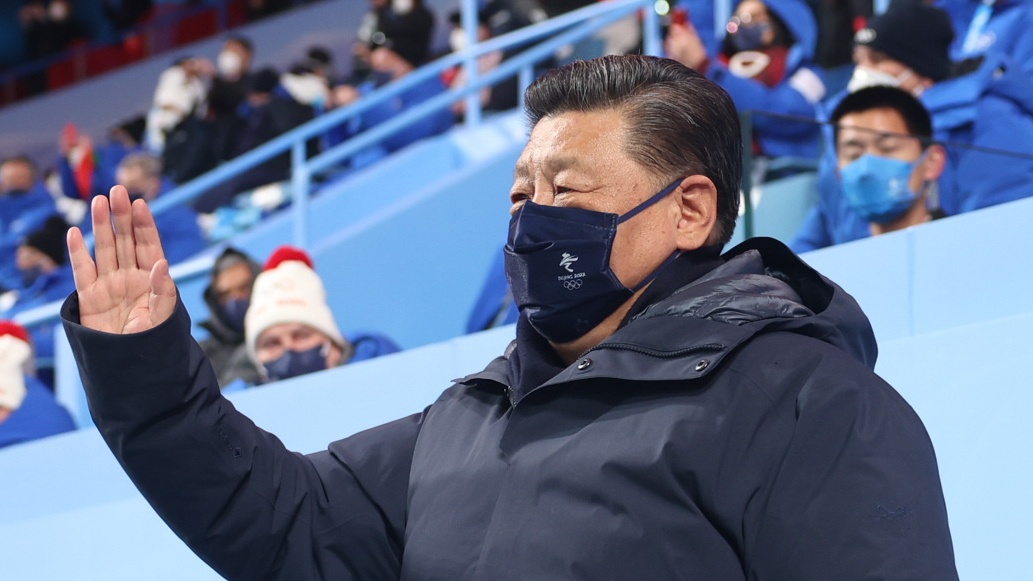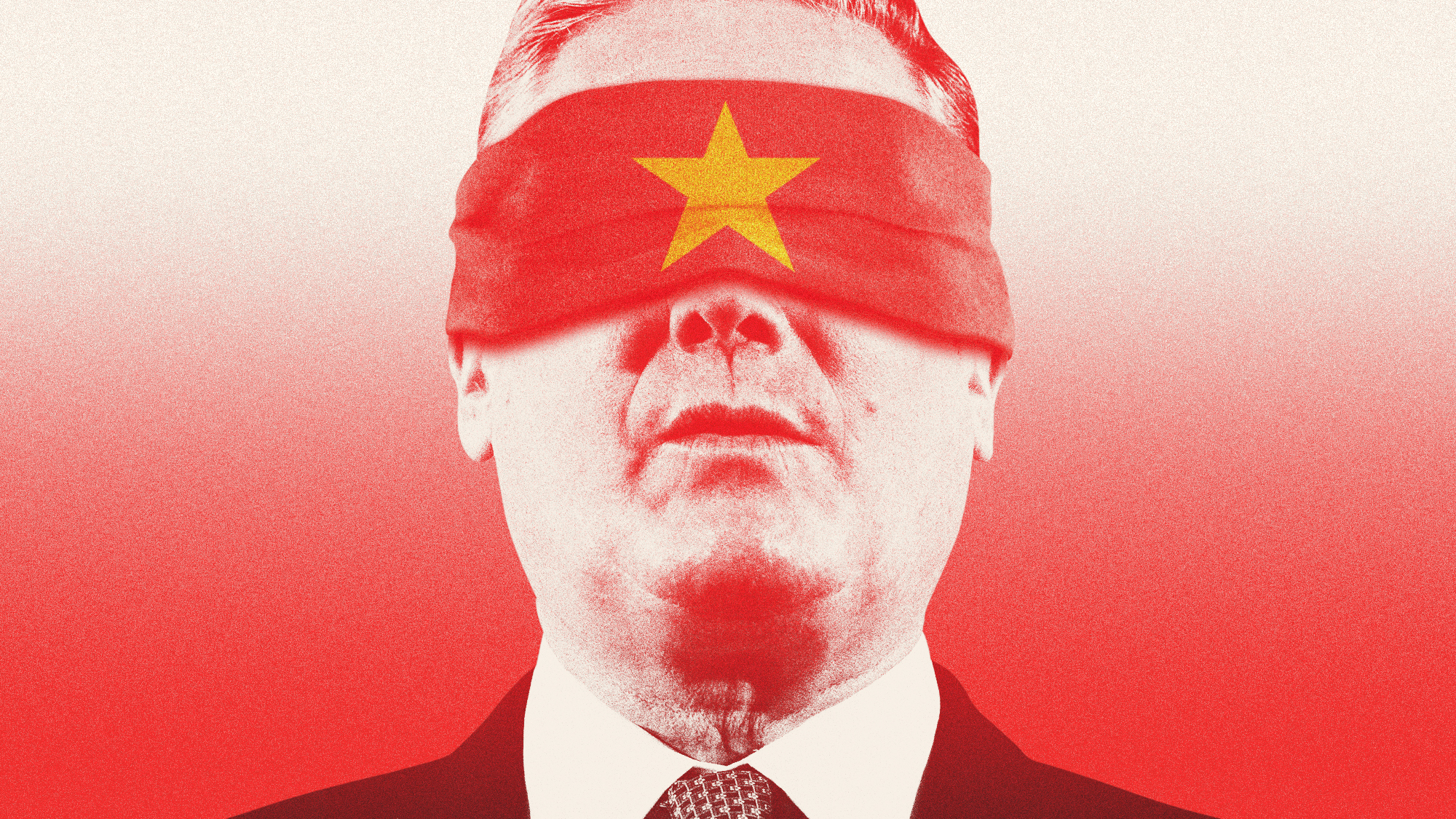The costs of the UK doing business with China
Boris Johnson angers ‘hawkish’ Conservative MPs with plan to reboot trade talks

A free daily email with the biggest news stories of the day – and the best features from TheWeek.com
You are now subscribed
Your newsletter sign-up was successful
Several leading Conservative MPs have voiced their concern over Boris Johnson’s desire to restart trade talks with Beijing and pursue closer economic ties with China.
The Department for International Trade has been told to plan “high-level ministerial talks with the Chinese government for the first time since 2018”, Politico said. The move has prompted “a backlash from Tory MPs who are concerned about China’s human rights record and the security implications of establishing closer ties with Beijing”.
One government official told the site that Johnson was personally pushing for the talks to restart, adding that “the Treasury are keen to revive it for this year and are nervous about a more hawkish China policy”.
The Week
Escape your echo chamber. Get the facts behind the news, plus analysis from multiple perspectives.

Sign up for The Week's Free Newsletters
From our morning news briefing to a weekly Good News Newsletter, get the best of The Week delivered directly to your inbox.
From our morning news briefing to a weekly Good News Newsletter, get the best of The Week delivered directly to your inbox.
Conservative fury
Revelations that the UK plans to pursue a closer economic relationship with China prompted Iain Duncan Smith, a former Conservative leader, to tell Politico that if the government “decides that they are going to kowtow to China by going over there and begging them to trade I have to tell you that they can think again.
“I make no bones about this: I will not let it rest if we start now, amid all the evidence of genocide, brutality, crackdowns on peaceful protesters, and go traipsing along there as though nothing happened,” he warned. “There’s no good them telling us that they’re going to clean up their act – because they never do.”
Tom Tugendhat, the Tory chair of the Commons foreign affairs committee who has already said he would stand for leader of the party in the next leadership election, said “the timing of the decision to relaunch trade discussions with China is surprising.
“The UK needs to make up its mind whether it wants a stronger economic relationship with China or whether it wants a new China strategy which reflects the challenge of trade coercion and human rights abuses,” he added.
A free daily email with the biggest news stories of the day – and the best features from TheWeek.com
The decision to pursue closer economic ties with Beijing comes as China is facing increased scrutiny over its human rights record due to the ongoing Winter Olympic Games in the country. Xi Jinping has also boasted of his close relationship with Vladimir Putin in recent weeks at a time when tensions have mounted on Russia’s border with Ukraine.
Beijing has also clashed with the British government over its move to offer refugees fleeing Hong Kong a path to residency in the UK. The plan prompted China’s ambassador to the UK to warn the government that is has “no sovereignty, jurisdiction or right of ‘supervision’ over Hong Kong”.
An issue for the government is that “the UK is more reliant on China for trade than ever as it shifts its focus beyond the EU in the aftermath of Brexit”, The Telegraph said.
Latest Office for National Statistics data shows that a seventh of all goods entering the UK last year came from China, a trend driven in part by the need to secure large deliveries of personal protective equipment (PPE), face masks and Covid-19 tests.
A year of “record trading” with China also “came at the expense of the EU”, the paper reported. “Britain traded more goods with the rest of the world than with the bloc for the first time in 2021, spurred on by Brexit and demand for fuel.”
‘Self-confessed Sinophile’
The government’s policy towards Chinese trade should be “coherent” with the UK’s “views on everything from the treatment of the Uyghurs to trade issues like Huawei to the behaviour over Taiwan and Hong Kong”, Tory MP David Davis told Politico.
“This seems to be completely at odds with that and it is hard to see how it could deliver success,” he warned. “If it did it would come at the cost of undermining every other aspect of our attempts to make the Chinese behave in a civilised manner.”
Labour has also staked out its opposition to the plans. Shadow foreign secretary David Lammy said that the government is “divided” over its approach to Beijing and appears to have “no strategy” for deciding on its future relationship with China.
The prime minister is “a self-confessed Sinophile”, the Daily Mail reported. And his new director of communications, Guto Harri, is a former lobbyist for Huawei, the company that was “banned from involvement in the UK's 5G network amid espionage fears”.
The appointment of Harri was enough to prompt “China hawks” within the Tory party to demand the appointment of “one of their own” to “compensate” for his involvement in the new No. 10 top team, The Sunday Times’ Whitehall editor Gabriel Pogrund tweeted.
The group of Beijing-sceptic Conservative MPs have called for “Iain Duncan Smith to be appointed to cabinet or someone from the party’s anti-China movement” to be introduced as a Downing Street special adviser, Pogrund said.
Against this backdrop, Johnson’s decision to pursue closer ties with China “is risky”, Politico said. This is because the PM remains “politically vulnerable because of accusations he broke the law by attending gatherings” hosted at No. 10 during national lockdowns.
-
 What to know before filing your own taxes for the first time
What to know before filing your own taxes for the first timethe explainer Tackle this financial milestone with confidence
-
 The biggest box office flops of the 21st century
The biggest box office flops of the 21st centuryin depth Unnecessary remakes and turgid, expensive CGI-fests highlight this list of these most notorious box-office losers
-
 The 10 most infamous abductions in modern history
The 10 most infamous abductions in modern historyin depth The taking of Savannah Guthrie’s mother, Nancy, is the latest in a long string of high-profile kidnappings
-
 How corrupt is the UK?
How corrupt is the UK?The Explainer Decline in standards ‘risks becoming a defining feature of our political culture’ as Britain falls to lowest ever score on global index
-
 The Mandelson files: Labour Svengali’s parting gift to Starmer
The Mandelson files: Labour Svengali’s parting gift to StarmerThe Explainer Texts and emails about Mandelson’s appointment as US ambassador could fuel biggest political scandal ‘for a generation’
-
 Can Starmer continue to walk the Trump tightrope?
Can Starmer continue to walk the Trump tightrope?Today's Big Question PM condemns US tariff threat but is less confrontational than some European allies
-
 Three consequences from the Jenrick defection
Three consequences from the Jenrick defectionThe Explainer Both Kemi Badenoch and Nigel Farage may claim victory, but Jenrick’s move has ‘all-but ended the chances of any deal to unite the British right’
-
 The high street: Britain’s next political battleground?
The high street: Britain’s next political battleground?In the Spotlight Mass closure of shops and influx of organised crime are fuelling voter anger, and offer an opening for Reform UK
-
 EU-Mercosur mega trade deal: 25 years in the making
EU-Mercosur mega trade deal: 25 years in the makingThe Explainer Despite opposition from France and Ireland among others, the ‘significant’ agreement with the South American bloc is set to finally go ahead
-
 Is Keir Starmer being hoodwinked by China?
Is Keir Starmer being hoodwinked by China?Today's Big Question PM’s attempt to separate politics and security from trade and business is ‘naïve’
-
 The MAGA civil war takes center stage at the Turning Point USA conference
The MAGA civil war takes center stage at the Turning Point USA conferenceIN THE SPOTLIGHT ‘Americafest 2025’ was a who’s who of right-wing heavyweights eager to settle scores and lay claim to the future of MAGA